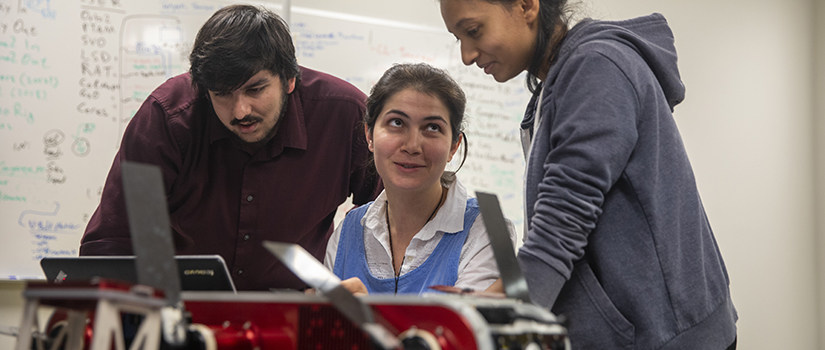Why Computer Science Graduate Study?
Graduate programs in computer science provide courses of study that emphasize the acquisition of advanced computer science knowledge, mastery of computing techniques, and student involvement in research initiatives and projects. Computer science research projects are supported by government agencies or are collaborative efforts with local industries. While software and hardware development are integral to one another at the advanced research and design levels, the emphasis of our computer science programs is software. Students whose interests lean more towards hardware aspects may want to consider our computer engineering graduate program.
Programs of Study
We offer the Ph.D. and M.S. in computer science. The Doctor of Philosophy (Ph.D.) degree focuses on research. The Ph.D. is essential for computer science faculty positions in higher education, as well as for many research and development occupations in industry and government laboratories. The Master of Science (M.S.) degree is designed for students seeking a competitive advantage on the job market and career advancement. The M.S. includes thesis and non-thesis options.
All graduate programs in computer science include advanced coursework in these core areas:
- Computer Architecture
- Compiler Construction
- Analysis of Algorithms
- Advances in Computing Seminar
Elective courses and research can be tailored to your specific interests, providing the opportunity to further strengthen your computer science expertise and your ability to apply this expertise in different areas of industry, government and society.
Visit Graduate Handbooks and Curricula for additional detail.
In the Computer Science Ph.D. program, you will formulate and perform research that is challenging and of wide interest in your area of specialization. You will develop the ability to advance the field of computing and to communicate research results effectively with others.
A total of 60 credit-hours is required for the Ph.D. in Computer Science. The program includes:
- Research resulting in a dissertation proposal, dissertation and defense, including 12 hours of dissertation credit
- 13 hours of core computer science courses
- 20 hours of computing electives
- 15 hours of additional computing or non-computing electives
- Qualifying and comprehensive exams
The M.S. in Computer Science provides in-depth knowledge on the core topics of computer software, compilers and algorithms, along with additional topics. Students in this may elect either the thesis or the non-thesis option. A thesis involving research in a particular area of study is intended for students that seek both breadth and depth in advanced computing topics. The M.S. program comprises 30 hours of graduate credit.
Degree components for the M.S. with thesis include:
- Research resulting in a thesis, thesis defense, and 6 hours of thesis credit
- 10 hours of core computer science courses
- 14 hours of electives, including up to 6 hours of non-computing courses and up to 3 hours of directed study
- A comprehensive exam
Degree components for the M.S. non-thesis option include:
- 10 hours of core computer science courses
- 20 hours of electives, including up to 6 hours of non-computing courses and up to 3 hours of directed study
- A comprehensive exam
Areas of Specialization
Course work and research can generally be conducted in any field of computer science coinciding with the research interests of our faculty, which include the following topics:
- Artificial intelligence
- Big data and data mining
- Bioinformatics and computational biology
- Computer vision
- Cyber and information security
- Machine learning
- Multiagent systems
- Quantum computing
- Robotics
- Strategic and economic impacts of information technology
Visit the Computer Science and Engineering Department for more information on our faculty and research areas
Graduate Admissions
All applications must be submitted to the Graduate School of the University of South Carolina. The Graduate School provides helpful information on the admissions application process and even lets you know what to do before you apply.
Admission to computer science graduate programs is competitive. Students may enter either the M.S. or the Ph.D. program directly from a bachelor’s degree program. The following guidelines are generally expected, but not necessarily sufficient, for admission.
- An undergraduate degree from a college or university of recognized standing, with a B average or better for all work completed.
- A strong background in computer science or computer engineering
- For international applicants, a TOEFL score of 80 or higher, or an IELTS score of 6.5 or higher.
Because admission is competitive, not all candidates satisfying these minimal standards can be admitted. Each application is evaluated by a departmental admissions committee, which makes an official recommendation to the Graduate School. The Graduate School makes the final decision and notifies the applicant of the decision.
